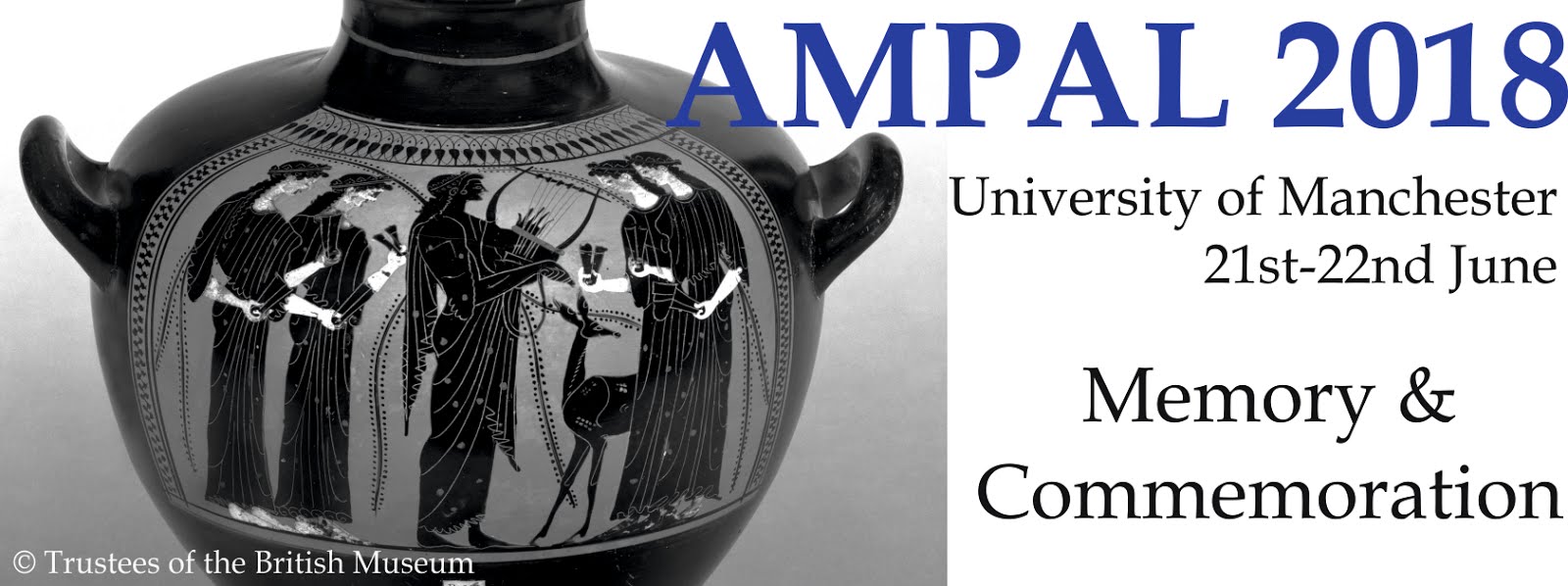Abstracts
Here you can find the titles and order for all papers at AMPAL 2018. You can access the abstracts for specific panels by following the link of each panel title.
Thursday 21st June
Parallel session 1 (9.45-11.15am)
Remembering Aeschylus (Eleni Krikona, University of Hamburg)
The Poet’s Bones: Poetic Monumentality and Bodily Remains in Propertius (Hannah Burke-Tomlinson, King’s College London)
Toto notus in orbe: gloria lata between literary and epigraphic conventions (Alessandra Tafaro, University of Warwick)
Quomodo itur ad astra? Augustan exemplarity and historical memory in the Octavia (Emily Mitchell, University of Oxford)
Memory of exemplary stories: Lelex relates Philemon and Baucis tale (Alessia Scalera, University of Bari Aldo Moro)
Cloelia immemorem me fecit: re-writing cultural memory in Valerius Maximus (Laura Chambers, University of Manchester)
Parallel session 2 (11.45-1.15pm)
Memory and Identity in Seneca’s Medea (Sophie Ngan, Durham University)
Audita mente notaui: Anamnesis and Pastoral Impersonation in the Speech of Ovid’s Galatea (Eleni Ntanou, University of Manchester)
Memory and manipulation in Apollonius’ Argonautica (Katharine Mawford, University of Manchester)
Recycling Plato: The Memory of Plato’s Chariot in The Trevi Fountain (Lotte Van Olmen, University of Ghent)
Elagabalus: the worst of them all? Why cultural attitudes to gender caused 18th and 19th century historians to vilify an emperor the 21st century has largely forgotten (Kathryn Adams, The Open University)
Selective Memory: the Ancient World and Modern Hate Groups (Alexander Hardwick, University of Oxford)
Parallel Session 3 (2.15-4.15pm)
Aristophanic "games of memory" (Alessandro Armocida, University of Padua)
Testing the Reader’s Memory: The Use and Effect of Repeated Vocabulary in Dares Phrygius (Marc Bonaventura, University of Cambridge)
A shameful memory: Deianira and the distorted narration of Hercules’ deeds in Ovid’s Heroides 9 (Simona Martorana, Durham University)
Meminisse iuvat, but not always: memory, fallible narratives and unreliable narrators in the Achilleid (Ach. 2.94-167) (Julene Abad Del Vecchio, University of Manchester)
Malleable memory in Augustan Rome - Ovid's Venus (Aimee Hinds, University of Leicester)
Quoting from Memory? Shared Knowledge in Cicero’s Book Fragments of the Republican Thyestes Tragedies (Maria Haley, University of Leeds)
Escaping Aeneas: Virgil, the Epic Tradition, and Aeneas’ Memory of the Trojan War (Davide Scarpignato, University of Exeter)
Euripides’ selective amnesia in mythical examples (Sabrina Mancuso, University of Tübingen)
Friday 22nd June
Parallel Session 4 (9.30-11.30am)
Local Memory and Ethnic Identities, Kleos and Fame in Rhianus' Epic Fragments (Manolis Spanakis, University of Crete (Rethymno))
The kleos of Hector and the mneme of Andromache (Konstantina Toumanidou, University of Vienna)
Redefining kleos in the Odyssey: the Orestes myth as a mythical exemplum of political and social reformation (Doukissa Kamini, University of Reading)
In the Name of the Father: Neoptolemus and the memory of Achilles in Sophocles’ Philoctetes (Martina Delucchi, University of Genoa)
Memories of the Countryside and the City: Reading the Landscape of Virgil's Eclogue 1 (Marina Grochocki, Universidade Federal do Paraná)
Commemorating the Mons: Aetna and Poetic Memory (Ben Pullan, University of Exeter)
Natura Melior Potentiorque: Reassessing and Remembering Domitian in Stat. Silv. 4.3 (Esther Meijer, Durham University)
Re-making Memories: Navigating Coastlines in Valerius Flaccus' Argonautica (Elaine Sanderson, University of Liverpool)
Parallel Session 5 (12-1.30pm)
Palaces of Memory, Houses of Forgetfulness? Architectural Space and Selective Memory in Pliny’s Epistles (Hannah Kirk-Evans, University of Cambridge)
Commodus: Contrast between how memory sanctions are displayed in the literary sources versus the archaeological evidence (Stefanie Ulrich, Birkbeck (University of London))
What it means to be a Cato to the state (Leanne Jansen, Leiden University)
Forgetfulness as a narrative device in Herodotus' Histories (Carlos Hernandez, University of Oslo)
Constructing and losing memories: the case of the Marathon runner (Valeria Melis, University of Cagliari)
Struggling for Commemoration: Epigraphic Interventions in Thucydidesʼ History (Benjamin Allgaier, Heidelberg University)
Parallel Session 6 (4-5.30pm)
What is hidden in gods’ memories? (Katarzyna Kostecka, University of Warsaw)
Gone and Not Forgotten (or forgotten and not gone?): Remembering the Titans in Hesiodic Myth (Susannah Ashton, Trinity College Dublin)
Commemorating Thetis in Epinicean Poetry (Sophie Milner, University of Leeds)
Remembering Domitian: the memoria of the last Flavian in Pliny and Tacitus (Martin Szoke, University of Cambridge)
Chains, Corruption and Condemnation: The Memory of Cannae in Plautus’ Captivi (Elinor Cosgrave, University of Leeds)
The “good” memory of the emperor: memoria as a double-edged sword (Martina Russo, University of Warwick)
The “good” memory of the emperor: memoria as a double-edged sword (Martina Russo, University of Warwick)

Comments
Post a Comment